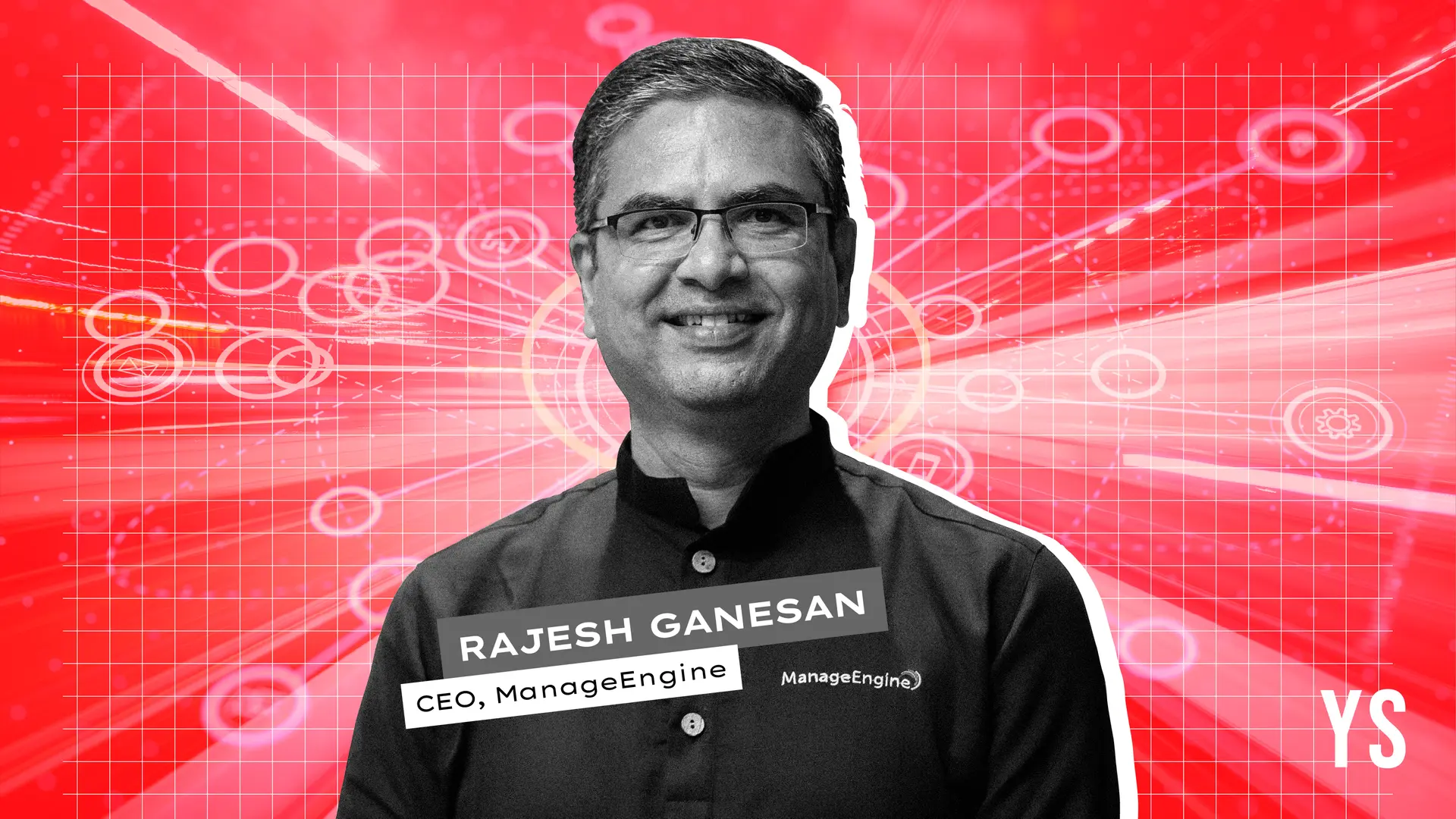AI is no longer a USP, it’s now fundamental to all tech: Zoho Corp’s ManageEngine CEO Rajesh Ganesan
In an exclusive interaction with YourStory, Ganesan breaks down ManageEngine's AI roadmap—from LLM-powered agents to privacy-first infrastructure and homegrown R&D, all charted by Zoho Chief Scientist Sridhar Vembu, to meet enterprise needs globally.
Long before officially rebranded itself from Advent Inc in 2009, ManageEngine was one of the firm’s earliest bets into IT management solutions, taking birth in 2002.
While ManageEngine primarily targets IT departments with over 60 products and enterprise solutions, Zoho focuses on small to medium-sized businesses with its online productivity tools.
Today, ManageEngine, which offers on-premises and cloud-native IT and security operations management solutions, has been quietly riding the AI adoption wave for the last 13 years, focusing on end-to-end IT management that spans automation, security, analytics, and compliance.
Serving nine of every 10 Fortune 100 organisations, ManageEngine has 18 data centres, 20 offices and over 200 channel partners worldwide, counting eyewear retailer and WAISL, a provider of digital airport consulting services, among its customers in India.
In 2023, Zoho founder Sridhar Vembu predicted that the IT arm could reach $1 billion in revenue within the next 2-3 years—an ambition the company is pursuing with its deep focus on AI innovation.
Rajesh Ganesan, CEO of ManageEngine, in an exclusive interview with YourStory, reveals how the company has been quietly embedding AI for over a decade, led by LLM- powered agents to transform the enterprise IT sector.
He further outlines how the company’s homegrown infrastructure and strong R&D, led by the new Chief Scientist Vembu, equips ManageEngine to meet AI-driven enterprise demands in India and globally.
Edited excerpts:
YourStory (YS): Can you give us an overview of what ManageEngine does, how it stands apart from Zoho?
Rajesh Ganesan: ManageEngine predates Zoho as a business unit, focusing on the CIO’s organisation—essentially the IT function within enterprises. Zoho provides SaaS applications for various business functions such as sales, legal, HR, and back-office while ManageEngine addresses the specific needs of IT teams.
These teams are often early adopters of new technology, deciding what remains on-premises, what moves to the cloud, and what should be offered as SaaS.
We’ve worked with AI for over 13 years—covering not only generative or interactive AI, but a broad range of intelligence applications. We are now at a point where it is not just about capabilities, but we have a good idea about the scale of problems AI can solve.
We’re also investing heavily in AI research, as evidenced by Sridhar Vembu’s transition to the role of Chief Scientist. We wanted to stay the course of the company with technology at the core of our DNA. He is going to focus and drive the Zoho Labs initiative, the AI initiative inside Zoho Corporation, which means all further developments will also feature in the ManageEngine product stack.
YS: Could you brief us on the latest AI agentic offerings? How will these AI agents help enterprises, particularly in IT management, given the concerns around data privacy and how AI operates within existing systems?
RG: We have recently launched our own “agent” or “agentic” capabilities, which will allow customers to quickly create fully autonomous AI agents with no human intervention. These agents can connect to multiple systems, interpret context, make predictions, and even initiate actions on their own.
Companies like Microsoft have been discussing this technology as well, but organisations like Zoho have a unique advantage due to our expertise in building business applications.
Currently, ManageEngine and Zoho together serve over 800,000 businesses worldwide. We hold a vast amount of customer data, which isn’t just about algorithms. We will plan to extend these autonomous capabilities to ManageEngine.
Privacy and data sovereignty are critical considerations for us. From our vantage point, we believe we have a solid grasp on four key aspects: capabilities, scalability, cost, and privacy. We’ve always built our technology from the ground up—our own SaaS services aren’t hosted by third parties. We develop our own technology stack, run our own data centers, and can therefore offer a strong privacy to our customers.
YS: With several companies today deploying AI agents, how does Zoho's IT management solutions scale to meet enterprise needs?
For personal use, AI is incredibly convenient. If Alexa plays the wrong song, it’s no big deal. But in an enterprise setting—where you might be closing a deal or reviewing a legal document—a mistake can be costly.
Companies like initially aimed to get to market fast, focusing less on privacy and security because they were targeting a different audience. For businesses, especially in sectors like healthcare, that’s not feasible.
What’s truly different now is the introduction of Large Language Models (LLMs). They provide “experience-based intelligence,” a sort of knowledge base—like having access to all those reference books that lawyers or doctors refer to – they always go back to bulky books to refer to specific cases.
Today’s AI is essentially built on top of the automation we already had, but now LLM-backed intelligence can parse multiple systems, understand the specific problem, and decide on the best course of action.
Usually, there’s still a final human approval step—such as pushing a patch to hundreds of machines if a virus is detected—because it’s not wise to automate everything without human oversight.
These improvements dramatically change the cost and efficiency. A typical password reset can cost $70–$80; with AI agents, it could be reduced to under a dollar. This is the value that enterprises will unlock with agentic systems.
YS: Is the AI agent developed entirely in-house, or do you leverage partnerships with platforms like Microsoft Azure or OpenAI?
RG: We refer to our in-house technology as Zia agents. We have an “Zia agent builder,” which is developed entirely in-house. This builder lets you create various AI agents, such as an HR agent, a sales agent, or an agent that automatically fills out RFPs (Request for Proposal), document that organisations send to vendors inviting them to submit proposals for a specific project or service.
For instance, when an RFP email arrives, it could be processed and filled in just ten seconds, with a sales professional reviewing it before sending.
The low-code, no-code elements within the agent builder come from Zoho’s own technology stack. However, these agents often need an LLM to understand content—like Word documents or PDFs.
That’s where we offer options: Zoho has its own LLM, which we keep fine-tuning, or customers can choose Azure OpenAI, DeepSeek, Meta, or other third-party models. Essentially, the entire agent-building system is in-house, for both Zoho.com and ManageEngine, but clients can select whichever LLM best meets their privacy and security needs.
YS: What about pricing? Many startups are shifting from traditional SaaS models to outcome-based pricing. Do you see any changes to ManageEngine’s product pricing in that regard?
RG: We haven’t made any concrete decisions yet. AI is simply another capability for us, so we don’t plan on charging a premium for it. Building the infrastructure does cost money, but we consider AI a natural evolution of technology. There will be change of pricing as the market dynamics dictate, but as things stand, we do not see AI as a capability that we will be charging a premium for.
Over the last 20 years, we’ve integrated new trends, without imposing a premium each time.
It’s also worth noting that many customers will need professional services—implementation, consulting, and so on—which can inherently be outcome-based. This is similar to how we moved from perpetual licensing to subscription licensing when software transitioned to SaaS. We’d rather wait for clarity to emerge before making definitive changes to our pricing model.
YS: Could you also talk about how ManageEngine differentiates itself from other players?
RG: We view AI as an extremely important capability within our product stack. AI is not going to be a USP for anyone anymore because it's going to be a fundamental part of all technology going forward.
Our USP has always been the way we build technology, the way we do business, and our long-term, holistic approach. It’s easy to add a few features, label them “AI,” and go to market, but we want to solve the real objectives our customers face—whether they’re in healthcare or BFSI (Banking, Financial Services, and Insurance) – with concerns revolving around productivity, resilience, and compliance.
BFSI, for instance, is always under attack and needs to stay compliant with various regulations and mandates. Every quarter, when a technology infrastructure audit happens, it’s a huge effort for any company.
We will continue to focus on end-to-end needs: automation, productivity, user experience, cybersecurity, compliance, analytics. When we do all of that, AI, machine learning, and workflows form a global services layer across our product stack, ultimately becoming our USP. ManageEngine becomes a unified platform that CIOs can use to meet their business objectives.
YS: What are ManageEngine's primary markets?
Our primary market in terms of revenue continues to be the US contributing 30%, followed closely by the UK and India. Five years ago, before 2019, India wasn't even in the picture. However, in the last three years—particularly as we emerged from COVID—we've seen significant traction here.
This growth is driven by factors like government regulations, India's infrastructure investments, and the overall positive economic trajectory.
Our top three markets would be the US, followed closely by the UK and India. After that, we have Australia and Canada, and Saudi Arabia. These six markets will likely remain our strongest as we head into 2025.
Edited by Affirunisa Kankudti








